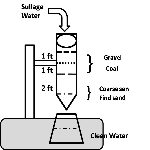
Low-cost drinking water treatment system for the salinity prone coastal area by Sikder and Shakhaoat
Please find below the
Finalist Evaluation
Judges'' comments
SUBJECT: Climate CoLab Judging Results
Proposal: Low-cost drinking water treatment system for the salinity prone coastal area
Thank you for participating in the 2015 Climate CoLab Adaptation contest, and for the time you spent in creating and revising your entry.
The Judges have strongly considered your proposal in this second round of evaluation, and have chosen to not advance it as a Finalist for this contest.
We, the Judges and contest Fellows, are truly grateful for your contribution to the Climate CoLab and for your commitment to address climate change.
We encourage you to keep developing your work. Transfer it to the Proposal Workspace to re-open it, make edits, add collaborators, and even submit it into a future contest. You can do so by logging into your account, opening your proposal, selecting the Admin tab, and clicking “Move proposal”.
We hope you will stay involved in the Climate CoLab community. Please support and comment on proposals that have been named Finalists and vote for which proposal you would like to be nominated as the contest’s Popular Choice Winner.
If you have questions, please contact the Climate CoLab staff at admin@climatecolab.org
Keep up the great work. And thank you again for being a part of this mission to harness the world’s collective efforts to develop and share innovative climate change solutions.
2015 Climate CoLab Judges
Additional comments from the Judges:
This is a strong proposal that proposes an innovative solution to a pressing problem. I would have liked to see a better discussion of the team who will manage this project. Looking at your user profile and the "strength" section of the proposal above it seems clear that this will be a project managed by an academic researcher and carried out with the help of graduate students. More detail on how this team will be composed and what their roles and responsibilities are would have made the proposal stronger.
The revised proposal is stronger and it remains a very solid project. I still worry that the budget is too low even for the early stages of solving the construction stage of the project. However, this is very specific and a good example of how an engineered solution can have real world impacts. I do believe that there are govt and NGO groups that would be eager to help implement a technical solution as proposed here. Good job.
Review from a technical expert raised questions about the feasibility of removing salt in coastal area drinking water using only these filters. More technical studies would be needed to prove the feasibility of this technology.
Semi-Finalist Evaluation
Judges'' ratings
| • | Novelty: | |
| • | Feasibility: | |
| • | Impact: | |
| • | Presentation: |
Judges'' comments
Congratulations! Your proposal, Low-cost drinking water treatment system for the salinity prone coastal area in the Adaptation contest, has been selected to advance to the Semi-Finalists round.
You will be able to revise your proposal and add new collaborators if you wish, from July 1st until July 14, 2015 at 23:59pm Eastern Time.
Judges' feedback are posted under the "Evaluation" tab of your proposal. Please incorporate this feedback in your revisions, or your proposal may not be advanced to the Finalists round. We ask you to also summarize the changes that you made in the comment section of the Evaluation tab.
At the revision deadline listed below, your proposal will be locked and considered in final form. The Judges will undergo another round of evaluation to ensure that Semi-Finalist proposals have addressed the feedback given, and select which proposals will continue to the Finalists round. Finalists are eligible for the contest’s Judges Choice award, as well as for public voting to select the contest’s Popular Choice award.
Thank you for your great work and again, congratulations!
2015 Climate CoLab Judges
The project seeks to develop affordable, locally sources solutions for drinking water in Bangladesh. The project is thoroughly described and sounds feasible. It is also relatively cheap, though I wonder if the budget is realistic. I think this project has great potential to address a very specific problem. I would like to see a realistic assessment of the likelihood of failure -- or at least the aspect of the project most likely to encounter resistance. I think a stronger case could be made for why existing solutions for this sort of filtering are less cost-effective that this solution. Is the main idea that the local resource could be replenished by the user themselves and so is much cheaper?I was less convinced that this would create knock-on impacts to the local politicians etc. That seemed like a stretch. I could be convinced if we could cite a similar outcome with a similar type project somewhere in the world. The biggest weakness of this strong proposal was the lack of large-scale dramatic impacts and the somewhat tangential relationship to climate. However, the opportunity to solve real world problems with a fairly simple and cost effective solution made the proposal compelling.
 Md.shakhaoat Hossain Jul 13, 2015 02:30 | Proposal contributor
Responses to the Judges’ Comments
1. Assessment of the Likelihood of failure: A new section of the SWAT analysis has been added in the revised proposal in which likelihood of failure of the proposed project has been mentioned.
2. Aspects likely to encounter resistance: A new section of the SWAT analysis has been added in the revised proposal in which strength of the proposed project to encounter resistance has been mentioned.
3. Proposed solution is much cost effective than existing solution: It is an innovative laterite soil impregnated porous pot filter (LSIPPF) composed of iron rich locally available laterite soil and plant biomass. The availability of the iron rich locally available laterite soil and plant biomass will make the proposed solution more cost effective. Actually there is no any existing solution to encounter this proposed problem in household level, but there is a pond sand filter system in Upazila (sub-district) level which is far away from the mass affected people due to lack of access and availability. Besides the efficiency of pond sand filter system is very low to remove salinity and contaminants in the water.
4. Similar type projects in the world: It has been mentioned in the revised proposal.
5. Large-scale dramatic impacts of the proposed project: Saline drinking water in coastal Bangladesh is caused by sea level rise due to climate change. Upon successful applicability of this research, every affected household will avail this drinking water system for safe drinking water as it is low cost and hence dramatically reduce the impacts of climate change induced sea level rise. It will be a great achievement for the adaptation of the impacts of climate change.
6. Relationship with climate change: It has been corrected in the overall revised proposal. Saline intrusion in the coastal Bangladesh is mainly caused by sea level rise due to climate change.
Changes made in the revised proposal
Following changes made in the revised proposal:
1. Some text has been modified in the Summery section of the description section in the revised proposal.
2. Some text has been added, deleted and modified in Background section.
3. SWAT (Strength, weakness, opportunity and threats) analysis of the proposed project has been added in a new section named Strategic analysis in the revised proposal.
4. Some text has been modified in the outputs/outcomes section.
5. A new section named “Similar type of projects in the world” has been added in the revised proposal.
|
 Md.shakhaoat Hossain Jul 13, 2015 03:58 | Proposal contributor
Budget low: I agree the budget is low against the proposed action of the project because the budget is made according to the award price that will be used absolutely to implement the proposed projects if we win the contest.
|